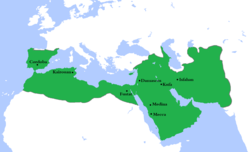Umayyad Caliphate
Appearance
(Reguidit frae Umayyad Empire)
The Umayyad Caliphate (Arabic: الخلافة الأموية, trans. Al-Khilāfat al-ʾumawiyya) wis the seicont o the fower major Islamic caliphates established efter the faith o Muhammad.
References
[eedit | eedit soorce]- ↑ "The Umayyads ruled for ninety years, taking white as their symbolic color as a reminder of the Prophet's first battle at Badr, and to distinguish themselves from the Abbasids, by using white, rather than black, as their color of mourning." Abdul Hadi, Evolution of the Arab Flag, 1986. "With its white flag, the Chinese Tang Dynasty referred to it [the Umayyad Dynasty] in historical literature as ' Baiyi Dashi,' the 'White Garment Calips.'" Li Qingxin, Maritime Silk Road, trans. W. W. Wang (2006), p. 47.
- ↑ The Peoples, Sekene Mody Cissoko, History of Humanity:From the Seventh to the Sixteenth Century, Vol. IV, ed. M.A. Al-Bakhit, L. Bazin and S.M. Cissoko, (UNESCO, 2008), 1190.[1]
- ↑ Jonathan Miran, Red Sea Citizens: Cosmopolitan Society and Cultural Change in Massawa, (Indiana University Press, 2009), 100.[2]
- ↑ Khalid Yahya Blankinship, The End of the Jihad State: The Reign of Hisham Ibn 'Abd al-Malik and the Collapse of the Umayyads, (SUNY Press, 1994), 286.[3]
- ↑ Khalid Yahya Blankinship, The End of the Jihad State: The Reign of Hisham Ibn 'Abd al-Malik and the Collapse of the Umayyads, 147.[4]
- ↑ Stefan Goodwin, Africas Legacies Of Urbanization: Unfolding Saga of a Continent, (Rowman & Littlefield, 2006), 85.[5]
- ↑ Islam in Somali History:Fact and Fiction, Mohamed Haji Muktar, The Invention of Somalia, ed. Ali Jimale Ahmed, (The Red Sea Press, Inc., 1995), 3.[6]


